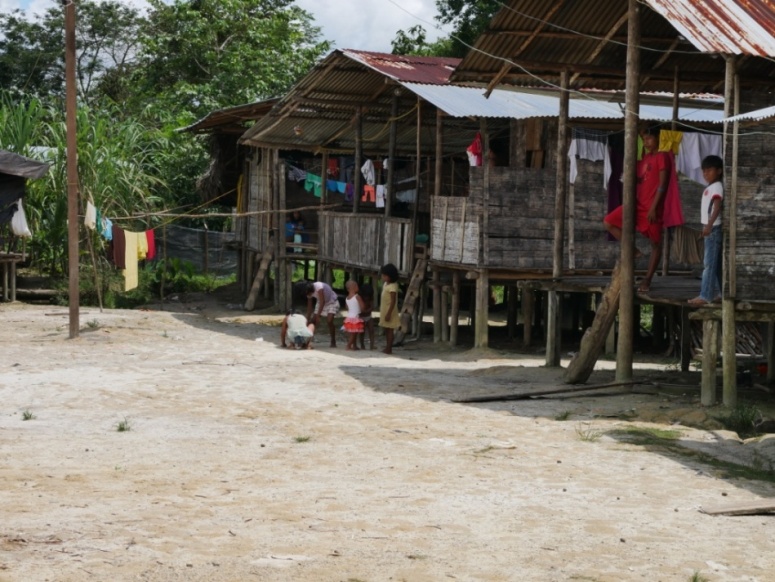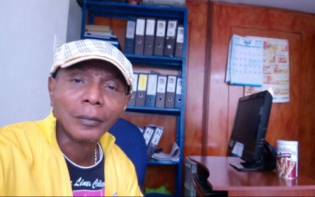SUMMARY
Lots to report this month, but first we give a warm welcome to a new member of our team: Joe Smith, our new Brazil Coordinator, who has produced the Brazil section of this newsletter. You will be hearing from Joe himself shortly. In this newsletter, we report among other things on the continuing deterioration in Venezuela, the disturbing rise in murders of human rights defenders in Colombia and proposals that would seriously reduce human rights protections in Brazil. There is good news from Chile and Paraguay, advance notice of a new campaign on Peru and a disappearance in Argentina. You are invited to join the Lambeth Group’s annual Embassy crawl which will include a stop at the Chilean Embassy
Wounaan family at a displaced settlement near Quibdo Chocó

Amnesty International has launched its first full report on Colombia in 2 years. The Years of Solitude Continue is a vivid account of what has gone wrong in the Chocó since the Peace Agreement was signed a year ago. Killings, forced displacements, anti-personnel mine casualties, rape, recruitment of girls and boys by armed groups are happening right now. The UN High Commission for Refugees reports 27 separate incidents of forced relocation in Chocó in the month of October 2017 alone. Over 6,000 Afro-descendant and indigenous people were forced off their land, losing their homes, their livelihood and way of life – in one month. They join 7.2 million internally displaced people – one in every six Colombians. Please download this report and distribute it as widely as possible. We will be sending you actions over the coming months.
Bernardo Cuero, leader of the Association of Displaced Afro-Colombians, was shot dead by two men on a motorbike 7 June 2017.

Amnesty has chosen Bernardo’s case to work on as part of the Human Rights Defenders (BRAVE) campaign. Although he received death threats and was granted some protection by the government for a while, there were no effective investigations into the threats and attacks against him, leaving him exposed to further violence. This is against a background of increased killings of human rights defenders in Colombia post the Peace Agreement with the FARC. An action will follow shortly.
t the Director of the Agency for Territorial Renovation (ART) at the Colombian Embassy. ART is the new development agency for communities in rural Colombia worst affected by the conflict, where coca is an important crop and where the poverty is most extreme. In all, there are about 250,000 people, including rural communities, in the Chocó. ART has a comprehensive plan, complete with ample consultation with local communities, to greatly improve their quality of life. The Director acknowledged that adequate funding, corruption and security were major challenges. 13 elite units of the military are being recruited from units outside these regions to replace those within them who had been ‘contaminated’. The cost of implementing the obligations of the Peace Agreement with the FARC were estimated at US$ 43.7 billion over 15 years, to include reparation for the 8 million victims of the conflict.
BRAZIL
We have a new Urgent Action on seven men who were killed on 11 November during a joint operation of the Civil Police and the army in São Gonçalo, Rio de Janeiro State. The case is not being investigated and the perpetrators could remain unpunished after approval of a law transferring the competence to try crimes committed by military personnel to military courts. Please write to the authorities listed in the Urgent Action, which you can access here.
The 11th Annual Brazilian Yearbook of Public Security revealed that Brazilian police killed 4,224 people in 2016. This was a 25.8 percent increase on 2015. Police killings were mostly commonly recorded in the state of Amapá, followed by Rio de Janeiro. The total number of homicides of all kinds during the year was 61,619 – 3.8 percent more than in 2015.
Eighteen members of the Lower House of Congress on 8 November voted in favour of a new constitutional amendment which would prohibit abortion under any circumstances. This amendment would need super-majority votes in both Houses of Congress and would apply to pregnancies resulting from rape or when the life of a woman is at risk. If it passes, it could lead to women and girls terminating unwanted pregnancies clandestinely, risking their lives. Hundreds of women have already died from unsafe abortions in the country in recent years. For Human Rights Watch’s account and more on the implicationsof the amendment, see here.
VENEZUELA
Human Rights Watch and the Penal Forum, a Venezuelan rights group, have issued a new report in which they highlight the systematic use of brutal treatment, including torture, against anti-government protestors and political opponents. Details, including an accompanying video, can be found here.
The European Union have announced a range of sanctions on Venezuela, banning arms sales, setting up a system for freezing assets and imposing travel restrictions on some government officials, adding that the steps could be reversed if President Maduro makes moves to reintroduce greater democracy. This follows similar moves by the US.
ARGENTINA
A woman taken from her mother as a newborn in Argentina has been reunited with her relatives by campaign group Grandmothers of the Plaza de Mayo. Adriana, who is now 40, was identified after she took a DNA test. Her DNA matched those of relatives of her parents, who disappeared under Argentina’s military rule. Adriana is the 126th child found by the Grandmothers, who campaign for victims of the “Dirty War”, when hundreds of children were taken from imprisoned and “disappeared” left-wing activists between 1976 and 1983.
There are reports of another killing by police during a raid on an Indigenous Mapuche community. Rafael Nahuel, who was 22, was shot in the back. Two others were wounded. The circumstances are under investigation.